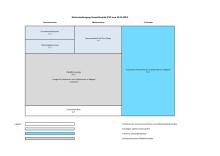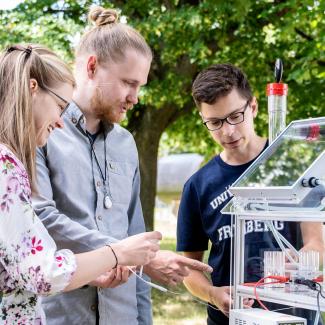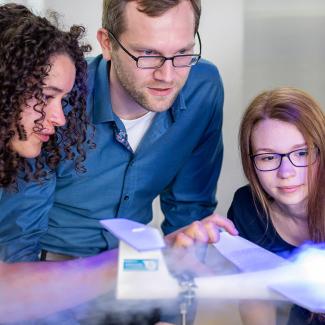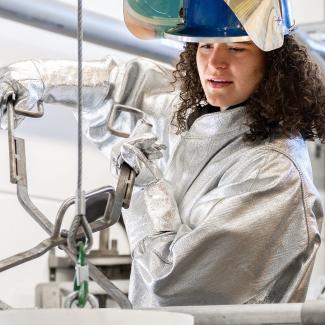Environmental Technology
In the three-semester Master's degree programme in Environmental Technology (ET), you must earn a total of 90 credit points (CPs). 30 CPs are allocated to the Master's thesis and 17 CPs to the three compulsory modules (Technology Assessment, Process Chain Simulation and Apparatus Engineering and Plant Design). You earn the remaining 43 CPs in the three areas of compulsory elective modules category A, compulsory elective modules category B and free elective modules. In the compulsory elective modules category A, you must choose two out of four available modules (approx. 12 CPs depending on your choice). The compulsory elective modules category B section contains at least 35 modules, from which you must select enough so that, together with the credits from the compulsory elective modules category A section, you have a total of at least 37 credits. This leaves 6 CPs from the area of holiday elective modules. Here you can choose freely from the range of all modules offered at TUBAF.
Thanks to the wide range of electives on offer, you are free to take many modules from one area of ET if you would like to specialise in one discipline of ET, or to spread the modules across the various disciplines of ET if you would prefer a broad education.
The Master's degree in ET no longer teaches the basics of natural sciences, engineering and process engineering. These are a prerequisite and the scientific training of future graduates in the Master's degree programme in Environmental Technology builds on them.
What else needs to be said:
- No more than five examinations per examination period, usually only four examinations per examination period. You don't have to rush from exam to exam! You have the time and opportunity to really get to grips with the material and learn it for your long-term memory.
- individual options by choosing compulsory elective modules from a predefined module catalogue and by choosing free elective modules. àYou can develop flexibly according to your engineering interests and you also have the opportunity to think outside the box
We, the study committee, are convinced that this Master's degree programme will prepare you excellently for future job profiles in industry and science and that you will be able to develop individually according to your interests.
We will be happy to support you. If you have any questions about the programme, please give us a call.
- Faculty
-
Faculty of Mechanical, Process and Energy Engineering (Faculty 4)
- Degree
-
Master of Science (M. Sc.)
- Standard period of study
-
3 Semester
- Part-time possible
-
No
- Start of studies
-
Winter semesterSummer semester
- Admission requirement
-
Professionally qualifying university degree in a related subject with a standard period of study of at least 7 semesters. Graduates of a 6-semester Bachelor's degree
can be admitted with conditions totaling 30 LP.Language requirement
- Application: with at least B1 level German
- Admission to the degree program: with C1 level German (e.g. DSH-2)
- language courses and DSH exam at TUBAF
- Course language
-
German
Environmental engineers find professional fields wherever engineering tasks have to be solved in close interaction with the respective economic and ecological environment. This often involves working in or leading interdisciplinary groups. Typical professional fields are:
Research and development
Research into the interactions between technical, ecological, economic and social influences and effects and their targeted utilisation for the sustainable development of the economy and society. Work in interdisciplinary groups with people from the fields of biology, climatology and other natural sciences as well as economics, law and social sciences.
Manufacturing companies
Planning and development of new products, production processes and production facilities in connection with their embedding in ecological, economic and legal contexts. In addition to leading interdisciplinary teams, dialogue with authorities and associations is an essential task.
Municipal and regional development offices
Planning and evaluation of supply and disposal facilities for industrial and commercial company sites, residential areas and municipal facilities in connection with ecological, economic and social interdependencies.
Approval and monitoring bodies
Ecological evaluation, auditing and certification of companies and products. The authorisation and monitoring bodies act as interfaces between business, society and public administration.



